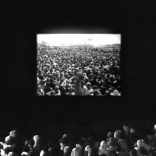Mozambique: Kugoma is back with 15th edition
Film entirely shot in Mozambique ‘Nyo Vweta Nafta’ wins Cinéma du Réel for best short movie

Terratreme Filmes / Entirely shot in Mozambique 'Nyo Vweta Nafta' won the Prix du court métrage at Paris Festival Cinema du Réel
Portuguese director Ico Costa’s film Nyo Vweta Nafta has won the award for Best Short Film [Prix du court métrage] at the Cinéma du Réel International Film Festival in Paris.
The film was shot entirely in Inhambane and Maputo in Mozambique, and, according to the festival program, is “a fragmentary and funny portrait of a youth who dreams, despairs, cleans, hooks up, and climbs baobabs”.
Speaking to Lusa, the filmmaker said he hoped the prize would be “an opportunity for the film to be screened more widely”. Costa said that the short film, which he also wrote, was born of a desire to return to the city of Inhambane in southern Mozambique, where he lived for a year “watching people and catching dialogue”, and found that, despite the poverty, life was not as gloomy as one might think.
Nyo Vweta Nafta, Costa’s fifth short film and his first since finishing his training at the Fresnoy Studio National des Arts Contemporains in France, debuted at the Rotterdam International Film Festival in the Netherlands.

Ico Costa revealed in February that his next film was to be filmed in the village of Avô, in the municipality of Oliveira de Hospital, and is a fictional portrait of the interior of Portugal. The film, now in post-production, is expected to be completed next year.
Composer Rodrigo Leão, also from Portugal, the won the award for original soundtrack for No Intenso Now, directed by the Brazilian João Moreira Sales. The film combines archive footage of the May 1968 student revolution in France, the Prague Spring suppression by Soviet troops of Czechoslovakia’s attempts to leave the Soviet bloc and the filmmaker’s mother’s journey through China in the year of the communist Cultural Revolution.
Three Portuguese documentaries were part of the program of Cinéma du Réel, including the documentary Luz Obscura by Susana de Sousa Dias, and O Cinema, Manoel de Oliveira e Eu, by João Botelho.












Leave a Reply
Be the First to Comment!
You must be logged in to post a comment.
You must be logged in to post a comment.